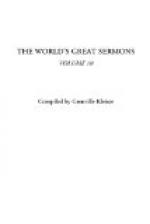The new interpretation is going to start from the Fatherhood of God. The old theories were all born in the counting-room, or the court-house. Jesus went into the house to find His illustrations for the conduct of the heavenly Father. He never went into the court-house, nor can we go there for analogies with which to image forth His dealings with our race. It was His custom to say, “If you, being evil, know how to give good gifts unto your children, how much more shall your Father which is in heaven give good things to them that ask him.”
The new interpretation is going to be comprehensive. It is going to be built, not on a single metaphor, but on everything that Jesus and the apostles said. Right there is where the old interpretations went astray. They seized upon one figure of speech and made that the determining factor in the entire interpretation. Jesus said many things, and so did His apostles, and all of them must contribute to the final interpretation.
Two things are to be hereafter made very clear: The first is that God reveals Himself in Jesus Christ. The old views were always losing sight of that great fact. There was always a dualism between God and Christ. I remember what my conception was when I was a boy. I thought that God was a strict and solemn and awful king, who was very angry because men had broken His law. He was just, and His justice had no mercy in it. Christ, His Son, was much better-natured and more compassionate, and He came forth into our world to suffer upon the cross that God’s justice might relax a little, and His heart be opened to forgive our race. I supposed that that was the teaching of the New Testament, it certainly was the teaching of the hymns in the hymn-book, if not of the preachers. And when I became a young man, I supposed that that was the teaching of the Christian religion. My heart rebelled against it. I would not accept it. I became an infidel. A man can not accept an interpretation of God that does not appeal to the best that is in him. No man can accept a doctrine that darkens his moral sense, or that confuses the distinction between right and wrong. I would not accept the old interpretation because my soul rose in revolt against it. I shall never forget how, one evening in his study, a minister, who had outgrown the old traditions, explained to me the meaning of the reconciliation. He assured me that God is love, invisible, eternal. Christ, His Son, is also love. In becoming at one with the Son we become at one with the Father. This is the at-one-ment. And when that truth broke upon me my heart began to sing:
Just as I am—Thy love unknown
Hath broken every barrier down;
Now, to be Thine, yea, Thine alone,
O Lamb of God, I come!




